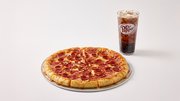News
Author explains how coffee giant lost its 'fidelity'
September 16, 2009
Author Ken Maney, who wrote "Trade-Off: Why Some Things Catch On, and Others Don't," outlines some of the reasons why Starbucks has struggled over the past few years in a story on CNN.
According to the story:
After a decade of stupendous success, Starbucks ran into trouble in 2007. Fewer people were coming into its stores. Profits sank. The stock dropped by nearly half through the year. In early 2008, Howard Schultz, who'd built the coffee chain into a global phenomenon, took back the CEO job he'd relinquished eight years before. Almost everything he said about what went wrong points to one simple explanation: Starbucks chased the fidelity mirage."If [Starbucks] could re-create in America the authentic Italian coffee-bar culture, it might resonate with other Americans the way it did with me," Schultz wrote in his autobiography, Pour Your Heart Into It. "Starbucks could be a great experience, and not just a great retail store."
In its heyday, the Starbucks experience was something special, Maney said. As the company expanded, however, it became ordinary.












